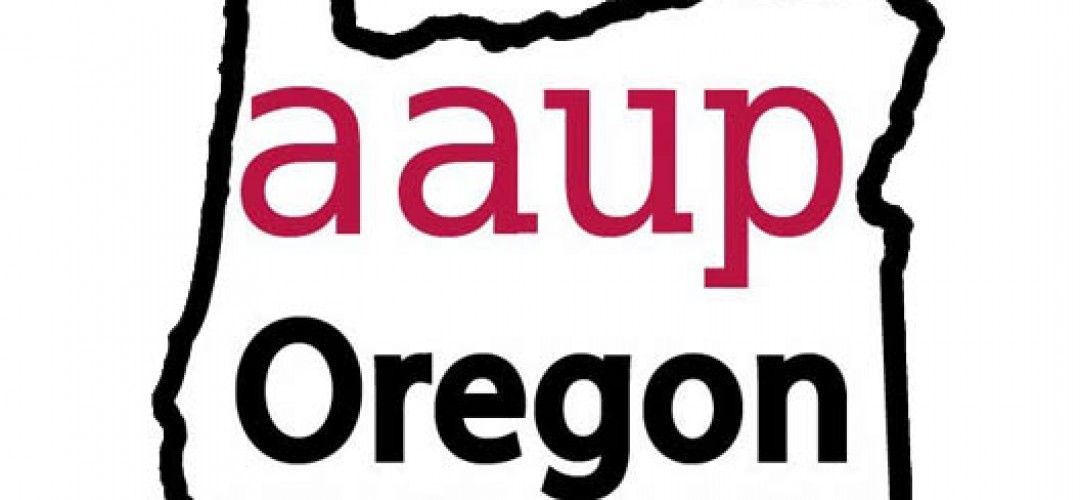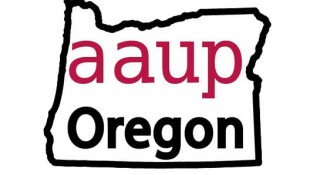Urgent Request to Protect Academic Freedom

March 20, 2019
Dear Friends and Colleagues,
We write to you with an urgent request to take action and protect academic freedom as a standard and criterion for accreditation by the Northwest Commission on Colleges and Universities (NWCCU), the largest single accreditation body in the region. Inexplicably, the latest draft of accreditation standards from the NWCCU removes all references to academic freedom and to institutional bodies and practices of shared governance such as university senates, faculty vote and voice, and tenure (see the proposal and compare to current standards here). The strong emphasis on centralized authority and the implicit erasure of faculty participation in decision-taking is new and it is a threat to the integrity of higher education at hundreds of colleges and universities in the region.
Presently, the NWCCU includes academic freedom as one of several standards central to the core mission of institutions. Perhaps the draft proposal to remove any mention of academic freedom was a mistake? We do not know the source of this extreme change, and thus we ask that at your earliest possible convenience you send an objection to the NWCCU for this error and ask that they immediately restore these vital standards for accreditation of institutions of higher education.
Academic freedom is the foundation of any institution that promises robust intellectual, artistic, and scientific inquiry and growth. Free thought is essential to a free society. Any college or university that fails to embrace such a basic standard falls short in delivering the potential of its faculty and students. Authoritarian, illiberal societies share a penchant for thought-control, censorship, and top-down forms of organizational structures. Sciences and the arts have never truly flourished in such environments. Is this the future of American liberal arts colleges and universities?
NWCCU serves as the accreditation body for most colleges and universities in Alaska, Washington, Oregon, Idaho, Montana, Utah and British Colombia, Canada. Representing thousands of faculty members in Oregon, the American Association of University Professors of Oregon (AAUP-OR) finds this proposed change to the accreditation standards to be short-sided and dangerous to the foundations of free inquiry, free thought, and a free society.
Please contact NWCCU to object to removing academic freedom as a standard for accreditation:
Submit your official comment here
Email your comment directly to NWCCU
Email the NWCCU Leadership:
Sonny Ramaswamy (Pres), Les Steele (Sr. VP), Pamela Goad (Sr. VP), Valerie W. Martinez (VP), Mac Powell, Ruth S. Bedford (Executive Assistant to the President)
sonny@nwccu.org, lsteele@nwccu.org, pgoad@nwccu.org, vwmartinez@nwccu.org, mpowell@nwccu.org, ruthb@nwccu.org
or call the NWCCU
Phone: 425-558-4224
Rationales for Academic Freedom as an institutional standard.
Nationally, the American Association of University Professors (AAUP) considers academic freedom as the indispensable requisite for unfettered teaching and research in institutions of higher education. The AAUP statement maintains that, “institutions of higher education are conducted for the common good and not to further the interest of either the individual teacher or the institution as a whole. The common good depends upon the free search for truth and its free exposition” (1940 Statement of Principles on Academic Freedom and Tenure, which has been endorsed by more than 250 national scholarly and educational associations).
Also nationally, the Association of Governing Boards of Universities and Colleges (AGB), in its Primer on Academic Freedom, states that academic freedom includes speech about institutional matters, not only teaching and scholarly publishing:
Most institutions operate with a shared governance model that gives faculty important – though not exclusive – authority over academic matters. . . .
Close observers of academic freedom tend to agree that the faculty’s participation in guiding the college on academic matters is a component of academic freedom. Faculty should remain free, they argue, to express their professional opinions on issues affecting the academic dimensions of their institutions.[1]
The State of Oregon maintains robust traditions, constitutional provisions, statutes and administrative rules to protect free speech and academic freedom. For example:
Oregon Revised Statutes § 351.870(5) states without any limitations that the State Board of Higher Education, “in keeping with the principle of academic freedom, shall insure open and free inquiry and publication in all institutions under its jurisdiction.”
Pursuant to this, the State Board of Higher Education’s Oregon Administrative Rule OAR 580-022-0005, titled “Academic Freedom,” has no restrictions on the subject matter or venue of speech that it protects. It provides that “the Board neither attempts to control, sway nor limit the personal opinion or expression of that opinion of any person on the faculty or otherwise on the Department’s payroll.”
Major universities throughout Oregon have strong academic freedom policies, crafted and developed through shared governance or through collective bargaining.
This value runs deep. Oregon State University does not limit speech to any particular areas and thus applying freedoms to all expression of opinion, including both governance and public affairs. Furthermore, it ensures freedom of speech for staff as well as faculty:
The University does not attempt to control the personal opinion, nor the public expression of that opinion, of any member of the faculty or staff of the institution. Indeed, the faculty and administration of Oregon State University feel a responsibility to protect the right of each employee to express his or her personal opinion, but in doing so, employees have an obligation to avoid any action which purports to commit the institution to a position on any issue without appropriate approval.[2]
At the University of Oregon we read:
“The University encourages and supports open, vigorous, and challenging debate across the full spectrum of human issues as they present themselves to this community.”
These institutional values reinforce and bolster the fundamental constitutional protections at the heart of our national society. To undercut and undervalue these principles as a fundamental standard for colleges and universities is frankly an insult to over 240 years of reasoned deliberation about the pursuit of knowledge in a free society.
American campuses, the true bedrock of America’s open society, are under threat. As faculty representatives we cannot agree with this attempt to accredit institutions of higher education without safeguards to the standards of academic freedom.
Please share this with faculty leadership at your institution and ask them to please convey their positions regarding the proposal by NWCCU to strike academic freedom as a standard for accreditation.
Yours,
Michael Dreiling
President, AAUP Oregon
Professor of Sociology, University of Oregon
Pedro García-Caro
Vice President, Academic Freedom & Shared Governance, AAUP Oregon
Director, Latin American Studies Program | Associate Professor of Spanish |
_____
[1] A Primer on Academic Freedom, Association of Governing Boards of Universities and Colleges
[2] Statement on Academic Freedom, Faculty Handbook, Oregon State University

